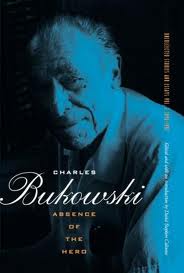This
volume of uncollected Bukowski stories and essays is not as substantial as
Volume 1: Portions From a Wine-Stained
Notebook (2008) but full of gold for the Bukowski reader. David Calone’s
introductory essay is erudite and demonstrates the serious tone in which
Bukowski studies are now conducted. Calone provides a clear, concise overview of
the context and personalities that Bukowski wrote about in many of the stories
and articles which appear in this volume. He also reveals Bukowski’s deep links
with the Beat writers and provides shrewd insights into the development of his writing
style.
About
a third of Absence of the Hero
consists of reviews of books by Allen Ginsberg, Louis Zukofsky, essays on d.a.
levy, Harry Norse, peace, the state of American poetry and reprints from his
L.A. Free Press column Notes Of A Dirty
Old Man. Probably the most appealing to me of his non-fiction writings,
include ‘Manifesto: A Call For Our Own Critics’- an appeal to small press
writers to develop their own language of criticism and ‘Bukowski On Bukowski’ in
which he favourably reviews Notes of a
Dirty Old Man (1969): ‘Frankly I read my own
stories in easy wonderment, forgetting who I was, almost almost, and I thought:
Ummm, ummm, this son of a bitch can really write.’ In contrast, he says of
reading his poetry, ‘Once I have written a poem and go back to it, I only get
the sense of vomit and waste.’
Far more interesting are Bukowski’s short stories, particularly the longer ones which characteristically begin simply but branch out like cancers into other
sub-strands of stories with unpredictable abandon and mayhem. The best short
stories often fictionalise Bukowski’s life as a writer in his early 50s and include
‘East Hollywood: The New Paris’, ‘Vern’s Wife’, ‘The Gambler’, ‘The Cat In the Closet’,
‘The Ladies Man of East Hollywood’ and ‘The Big Dope Reading.’. The best short
story in the collection is clearly ‘I Just Write Poetry So I Can Go To Bed With
Girls’ which provides a deranged but affectionate portrait of Gregory Corso.
City Lights take their Bukowski uncollected stories
and essays seriously and David Calonne has meticulously assembled and
documented the two volumes of this series. Unlike a lot of the posthumous ECCO
publications, this is essential reading for every Bukophile.
See
also my short review of Portions From a
Wine-Stained Notebook here: http://georgedanderson.blogspot.com.au/2011/11/charles-bukowski-portions-from-wine.html
